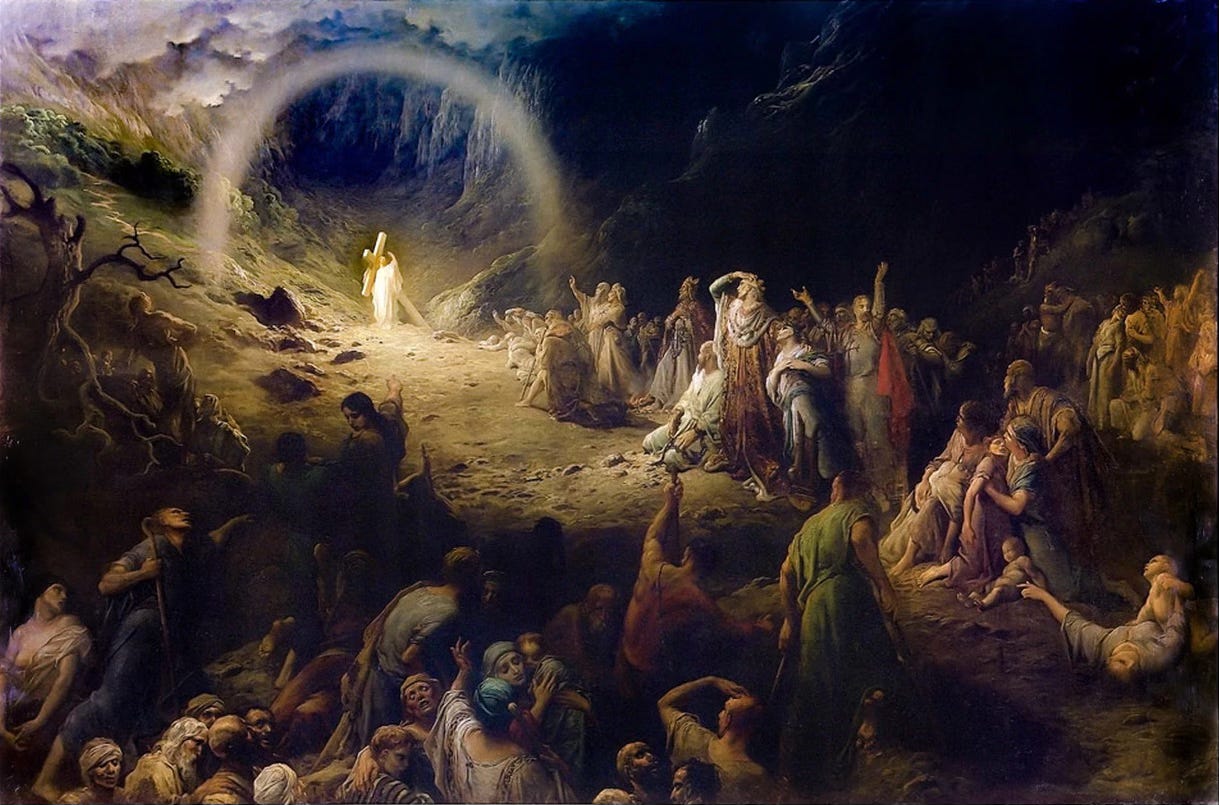The Descent of Christ into Hell: A Meditation for Holy Saturday with St. Thomas Aquinas
Here is a meditation from St. Thomas Aquinas, this time on the mysterious and often misunderstood descent of Christ into hell. As with the others, I’ve left most of Aquinas’ words unedited, simply adding a few brief notes to help connect the points. I hope this helps you pray and reflect as we await the joy of Easter morning.
“He descended into hell.” — Apostles’ Creed
From this descent, Aquinas draws out four spiritual lessons for our instruction.
1. Firm Hope in God
“No matter what the trouble in which a man finds himself, he should always put trust in God's help and rely on it. There is no trouble greater than to find oneself in hell. If then Christ freed those who were in hell, any man who is a friend of God cannot but have great confidence that he too shall be freed from whatever anxiety holds him.”
Aquinas recalls the words of Wisdom:
“Wisdom forsook not the just when he was sold, but delivered him from sinners; she went down with him into the pit, and in bands she left him not” (Wis. 10:13–14).
And from Ecclesiasticus:
“He that feareth the Lord shall tremble at nothing and shall not be afraid: for he is his hope” (Ecclus. 34:16).
If Christ descended even to the depths to save the just, then let us trust in His power to deliver us from any darkness.
2. A Sobering Call to Fear, Not Presumption
“Although Christ suffered for sinners and went down into hell to set them free, He did not set all sinners free, but only those who were free of mortal sin.”
Aquinas warns:
“Those who had died in mortal sin He left there. Wherefore for those who have gone down to hell in mortal sin, there remains no hope of pardon.” “They shall be in hell as the holy Fathers are in heaven—that is, forever.”
This is not meant to drive us to despair, but to shatter complacency. Christ's mercy is boundless, but not automatic. Let us not presume upon grace.
3. A Call to Reflect Often on Hell
“Christ went down into hell for our salvation, and we should be careful frequently to go down there too—turning over in our minds hell’s pain and penalties.”
Aquinas quotes Isaiah:
“I said: In the midst of my days I shall go to the gates of hell” (Is. 38:10).
He writes:
“Those who in their meditation often go down to hell during life, will not easily go down there at death.”
Such reflection, Aquinas says, is:
“A powerful arm against sin and a useful aid to bring a man back from sin.”
“Daily we see men kept from evildoing by the fear of the law’s punishments. How much greater care should they not take on account of the punishment of hell—greater in its duration, in its bitterness, and in its variety.”
And finally:
“Remember thy last end, and thou shalt never sin” (Ecclus. 7:40).
4. A Lesson in Love: Aid the Holy Souls
“Christ went down into hell to set free those that were His own. We, too, therefore, should go down there to help our own.”
Aquinas turns our attention to purgatory:
“For those who are in purgatory are themselves unable to do anything, and therefore we ought to help them.”
He offers a piercing analogy:
“Truly he would be a harsh man indeed who failed to come to the aid of a kinsman who lay in prison here on earth. How much more harsh, then, the man who will not aid the friend who is in purgatory—for there is no comparison between the pains there and the pains of this world.”
Quoting Job:
“Have pity on me, have pity on me, at least you my friends, because the hand of the Lord hath touched me”(Job 19:21).
How do we help them?
“We help the souls in purgatory chiefly by these three means: by Masses, by prayers, and by almsgiving.”
And Aquinas concludes with this simple truth:
“Nor is it wonderful that we can do so, for even in this world a friend can make satisfaction for a friend.”
Christ descended into hell—not as a prisoner, but as a liberator. Let us place our hope in Him, fear sin, meditate often on eternal truths, and show love by aiding the holy souls.
If these Holy Week meditations from Aquinas have helped you pray and reflect, I’d love to hear from you in the comments. I’ll post one more tomorrow—for the joy of Easter morning.



Thank you for these. Happy Easter season, Matt. I discovered Pints with Aquinas through simple Youtube searches, but I was craving a mainstream outlet that delved deeper into Catholic faith through conversation. Posts like these inspire the day ahead, even the week ahead. Thank you for the work you do and I look forward to more!
You guys make it seem like you think a monster is in charge of the universe. Rather than be appalled by his actions, you seek to convince yourselves that he is somehow still good and worth loving. Doing gymnastics to try to make hell our choice and something we deserve. It's asinine. If I were in charge of the universe instead of this monster, everyone would be as happy as possible. The worst fate I could imagine consigning someone to, would be pacifying pleasure for all eternity.